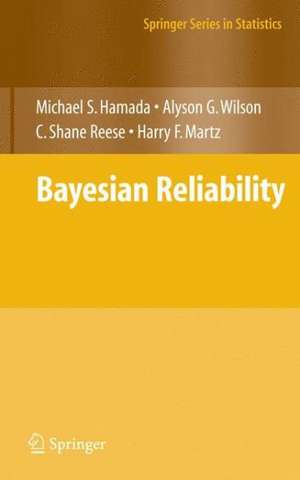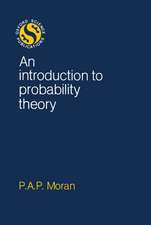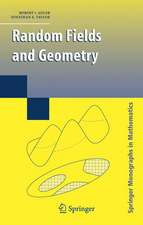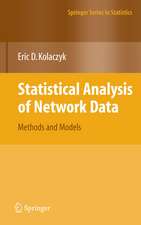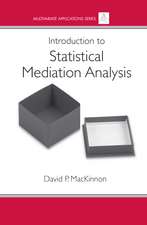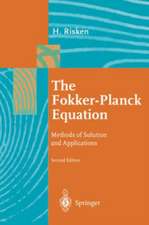Bayesian Reliability: Springer Series in Statistics
Autor Michael S. Hamada, Alyson Wilson, C. Shane Reese, Harry Martzen Limba Engleză Paperback – 10 noi 2010
The authors extensively use such tools throughout this book, focusing on assessing the reliability of components and systems with particular attention to hierarchical models and models incorporating explanatory variables. Such models include failure time regression models, accelerated testing models, and degradation models. The authors pay special attention to Bayesian goodness-of-fit testing, model validation, reliability test design, and assurance test planning. Throughout the book, the authors use Markov chain Monte Carlo (MCMC) algorithms for implementing Bayesian analyses -- algorithms that make the Bayesian approach to reliability computationally feasible and conceptually straightforward.
This book is primarily a reference collection of modern Bayesian methods in reliability for use by reliability practitioners. There are more than 70 illustrative examples, most of which utilize real-world data. This book can also be used as a textbook for a course in reliability and contains more than 160 exercises.
Noteworthy highlights of the book include Bayesian approaches for the following:
- Goodness-of-fit and model selection methods
- Hierarchical models for reliability estimation
- Fault tree analysis methodology that supports data acquisition at all levels in the tree
- Bayesian networks in reliability analysis
- Analysis of failure count and failure time data collected from repairable systems, and the assessment of various related performance criteria
- Analysis of nondestructive and destructive degradation data
- Optimal design of reliability experiments
- Hierarchical reliability assurance testing
| Toate formatele și edițiile | Preț | Express |
|---|---|---|
| Paperback (1) | 1115.46 lei 6-8 săpt. | |
| Springer – 10 noi 2010 | 1115.46 lei 6-8 săpt. | |
| Hardback (1) | 1119.08 lei 6-8 săpt. | |
| Springer – 10 iul 2008 | 1119.08 lei 6-8 săpt. |
Din seria Springer Series in Statistics
- 14%
 Preț: 679.60 lei
Preț: 679.60 lei - 20%
 Preț: 630.98 lei
Preț: 630.98 lei - 20%
 Preț: 816.45 lei
Preț: 816.45 lei - 20%
 Preț: 1000.85 lei
Preț: 1000.85 lei -
 Preț: 390.84 lei
Preț: 390.84 lei - 20%
 Preț: 697.14 lei
Preț: 697.14 lei - 20%
 Preț: 445.20 lei
Preț: 445.20 lei - 20%
 Preț: 884.71 lei
Preț: 884.71 lei - 18%
 Preț: 1237.14 lei
Preț: 1237.14 lei - 18%
 Preț: 961.82 lei
Preț: 961.82 lei - 18%
 Preț: 956.50 lei
Preț: 956.50 lei - 18%
 Preț: 794.25 lei
Preț: 794.25 lei - 15%
 Preț: 648.05 lei
Preț: 648.05 lei - 18%
 Preț: 1217.10 lei
Preț: 1217.10 lei - 15%
 Preț: 646.11 lei
Preț: 646.11 lei - 15%
 Preț: 647.08 lei
Preț: 647.08 lei - 15%
 Preț: 646.11 lei
Preț: 646.11 lei - 18%
 Preț: 1329.76 lei
Preț: 1329.76 lei - 15%
 Preț: 652.81 lei
Preț: 652.81 lei - 18%
 Preț: 1114.52 lei
Preț: 1114.52 lei - 18%
 Preț: 952.40 lei
Preț: 952.40 lei - 18%
 Preț: 1333.42 lei
Preț: 1333.42 lei - 18%
 Preț: 1561.68 lei
Preț: 1561.68 lei - 18%
 Preț: 1231.47 lei
Preț: 1231.47 lei - 15%
 Preț: 513.64 lei
Preț: 513.64 lei - 18%
 Preț: 893.71 lei
Preț: 893.71 lei - 15%
 Preț: 649.87 lei
Preț: 649.87 lei - 18%
 Preț: 1007.65 lei
Preț: 1007.65 lei - 18%
 Preț: 1111.67 lei
Preț: 1111.67 lei - 18%
 Preț: 1223.70 lei
Preț: 1223.70 lei - 18%
 Preț: 892.74 lei
Preț: 892.74 lei - 18%
 Preț: 913.26 lei
Preț: 913.26 lei - 18%
 Preț: 943.88 lei
Preț: 943.88 lei -
 Preț: 391.61 lei
Preț: 391.61 lei -
 Preț: 391.22 lei
Preț: 391.22 lei - 18%
 Preț: 1331.18 lei
Preț: 1331.18 lei -
 Preț: 390.84 lei
Preț: 390.84 lei - 18%
 Preț: 888.45 lei
Preț: 888.45 lei - 18%
 Preț: 960.61 lei
Preț: 960.61 lei - 18%
 Preț: 1245.34 lei
Preț: 1245.34 lei - 18%
 Preț: 964.54 lei
Preț: 964.54 lei - 15%
 Preț: 643.16 lei
Preț: 643.16 lei - 18%
 Preț: 1723.76 lei
Preț: 1723.76 lei - 15%
 Preț: 643.84 lei
Preț: 643.84 lei - 15%
 Preț: 586.37 lei
Preț: 586.37 lei - 18%
 Preț: 999.59 lei
Preț: 999.59 lei - 15%
 Preț: 643.34 lei
Preț: 643.34 lei - 18%
 Preț: 806.40 lei
Preț: 806.40 lei - 18%
 Preț: 727.66 lei
Preț: 727.66 lei
Preț: 1115.46 lei
Preț vechi: 1360.32 lei
-18% Nou
Puncte Express: 1673
Preț estimativ în valută:
213.44€ • 232.58$ • 179.86£
213.44€ • 232.58$ • 179.86£
Carte tipărită la comandă
Livrare economică 23 aprilie-07 mai
Preluare comenzi: 021 569.72.76
Specificații
ISBN-13: 9781441926739
ISBN-10: 1441926739
Pagini: 456
Ilustrații: XVI, 436 p.
Dimensiuni: 155 x 235 x 24 mm
Greutate: 0.64 kg
Ediția:2008
Editura: Springer
Colecția Springer
Seria Springer Series in Statistics
Locul publicării:New York, NY, United States
ISBN-10: 1441926739
Pagini: 456
Ilustrații: XVI, 436 p.
Dimensiuni: 155 x 235 x 24 mm
Greutate: 0.64 kg
Ediția:2008
Editura: Springer
Colecția Springer
Seria Springer Series in Statistics
Locul publicării:New York, NY, United States
Public țintă
ResearchCuprins
Reliability Concepts.- Bayesian Inference.- Advanced Bayesian Modeling and Computational Methods.- Component Reliability.- System Reliability.- Repairable System Reliability.- Regression Models in Reliability.- Using Degradation Data to Assess Reliability.- Planning for Reliability Data Collection.- Assurance Testing.
Recenzii
From the reviews:
"This book is written to provide a reference collection of modern Bayesian methods in reliability. Since all of the chapters include exercises, it could be used as the basis for an undergraduate or graduate course in reliability.… it provides a more concrete view of reliability with worked out examples. It does not require any background in Bayesian thinking from the reader—all that is required is a basic knowledge of probability and applied statistics.… I recommend this book to any reader who wishes to learn about the practical application of Bayesian thinking in reliability." (James H. ALBERT, JASA , June 2009, VOl.104, No. 486)
"Readership: Reliability practitioners, Bayesian researchers in reliability. The book may also be used as a textbook for a course for advanced undergraduates or graduate students … . This is a very well written Bayesian book on reliability with almost encyclopedic coverage. … Given the strengths of the book in both coverage and detailed modeling of reliability based on many different kinds of data … the book makes a major contribution to the literature on reliability." (Jayanta K. Ghosh, International Statistical Review, Vol. 77 (3), 2009)
"This is both a reference and a very complete textbook on Bayesian reliability. … The sequence of the topics is very logical and well organized. Starting from basics allows the use of the book by engineers and readers without previous knowledge of statistics … ." (Mauro Gasparini, Zentralblatt MATH, Vol. 1165, 2009)
“The authors give the reader a thorough statistical understanding of lifetime or failure time analysis of products or systems. … This book brings to the reader a collection of modern Bayesian statistical methods for use in reliability and lifetime analysis for practitioners, but can serve also as a textbook for an undergraduate or graduate course in reliability. In the book are 70 illustrative examples with anadditional 165 exercises down-loadable from a reference website and are accompanied by a solution manual.” (Adriana Horníková, Technometrics, Vol. 51 (4), November, 2009)
"This book is written to provide a reference collection of modern Bayesian methods in reliability. Since all of the chapters include exercises, it could be used as the basis for an undergraduate or graduate course in reliability.… it provides a more concrete view of reliability with worked out examples. It does not require any background in Bayesian thinking from the reader—all that is required is a basic knowledge of probability and applied statistics.… I recommend this book to any reader who wishes to learn about the practical application of Bayesian thinking in reliability." (James H. ALBERT, JASA , June 2009, VOl.104, No. 486)
"Readership: Reliability practitioners, Bayesian researchers in reliability. The book may also be used as a textbook for a course for advanced undergraduates or graduate students … . This is a very well written Bayesian book on reliability with almost encyclopedic coverage. … Given the strengths of the book in both coverage and detailed modeling of reliability based on many different kinds of data … the book makes a major contribution to the literature on reliability." (Jayanta K. Ghosh, International Statistical Review, Vol. 77 (3), 2009)
"This is both a reference and a very complete textbook on Bayesian reliability. … The sequence of the topics is very logical and well organized. Starting from basics allows the use of the book by engineers and readers without previous knowledge of statistics … ." (Mauro Gasparini, Zentralblatt MATH, Vol. 1165, 2009)
“The authors give the reader a thorough statistical understanding of lifetime or failure time analysis of products or systems. … This book brings to the reader a collection of modern Bayesian statistical methods for use in reliability and lifetime analysis for practitioners, but can serve also as a textbook for an undergraduate or graduate course in reliability. In the book are 70 illustrative examples with anadditional 165 exercises down-loadable from a reference website and are accompanied by a solution manual.” (Adriana Horníková, Technometrics, Vol. 51 (4), November, 2009)
Textul de pe ultima copertă
Bayesian Reliability presents modern methods and techniques for analyzing reliability data from a Bayesian perspective. The adoption and application of Bayesian methods in virtually all branches of science and engineering have significantly increased over the past few decades. This increase is largely due to advances in simulation-based computational tools for implementing Bayesian methods.
The authors extensively use such tools throughout this book, focusing on assessing the reliability of components and systems with particular attention to hierarchical models and models incorporating explanatory variables. Such models include failure time regression models, accelerated testing models, and degradation models. The authors pay special attention to Bayesian goodness-of-fit testing, model validation, reliability test design, and assurance test planning. Throughout the book, the authors use Markov chain Monte Carlo (MCMC) algorithms for implementing Bayesian analyses--algorithms that make the Bayesian approach to reliability computationally feasible and conceptually straightforward.
This book is primarily a reference collection of modern Bayesian methods in reliability for use by reliability practitioners. There are more than 70 illustrative examples, most of which utilize real-world data. This book can also be used as a textbook for a course in reliability and contains more than 160 exercises.
Noteworthy highlights of the book include Bayesian approaches for the following:
The authors extensively use such tools throughout this book, focusing on assessing the reliability of components and systems with particular attention to hierarchical models and models incorporating explanatory variables. Such models include failure time regression models, accelerated testing models, and degradation models. The authors pay special attention to Bayesian goodness-of-fit testing, model validation, reliability test design, and assurance test planning. Throughout the book, the authors use Markov chain Monte Carlo (MCMC) algorithms for implementing Bayesian analyses--algorithms that make the Bayesian approach to reliability computationally feasible and conceptually straightforward.
This book is primarily a reference collection of modern Bayesian methods in reliability for use by reliability practitioners. There are more than 70 illustrative examples, most of which utilize real-world data. This book can also be used as a textbook for a course in reliability and contains more than 160 exercises.
Noteworthy highlights of the book include Bayesian approaches for the following:
- Goodness-of-fit and model selection methods
- Hierarchical models for reliability estimation
- Fault tree analysis methodology that supports data acquisition at all levels in the tree
- Bayesian networks in reliability analysis
- Analysis of failure count and failure time data collected from repairable systems, and the assessment of various related performance criteria <
- Analysis of nondestructive and destructive degradation data
- Optimal design of reliability experiments
- Hierarchical reliability assurance testing
Caracteristici
Includes supplementary material: sn.pub/extras
